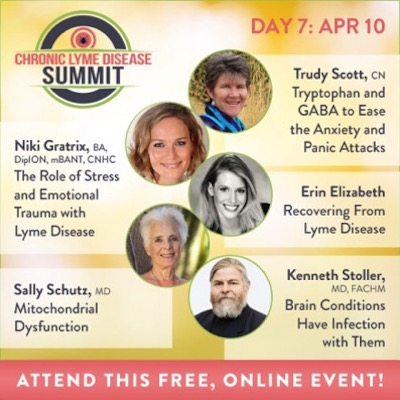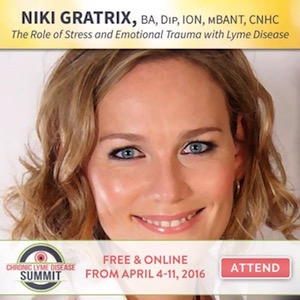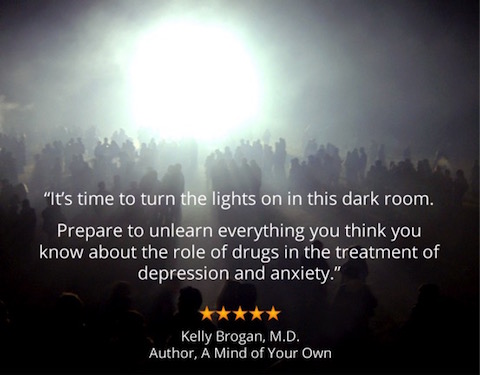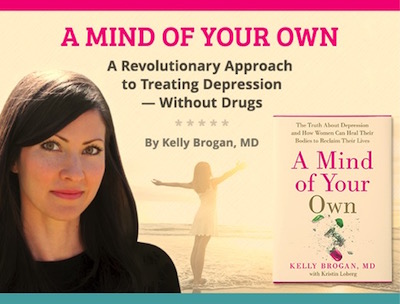Just a quick reminder that today is the last day of new interviews for the Chronic Lyme Disease Summit and tomorrow you get a full day of replays of ALL the interviews.
Here is the line-up for today, day 7:
My interview airs today: Tryptophan and GABA to ease the Anxiety and Panic Attacks
- Many people with chronic Lyme disease have chronic anxiety too and the focus of my interview is how to use targeted individual amino acids GABA and tryptophan to top up low levels of GABA and serotonin while the Lyme is being addressed.
- This gives Lyme sufferers resolution from much of the anxiety (if not all) right away and they don’t need to resort to meds like benzodiazepines or anti-depressants (like the women in the study below). There is also a big connection between Lyme disease and pyroluria and I cover this too.
You can read a bit more about some of the research I discuss here:
https://www.everywomanover29.com/blog/chronic-lyme-disease-summit-anxiety-pyroluria/
Here is a snippet from The Role of Stress & Emotional Trauma with Lyme Disease, a fascinating interview with Niki Gratrix (we’ve met and I love the work she is doing in this area of ACEs):
…stress and emotional trauma have a primary effect on your biology. So emotional trauma in childhood, if you like, your biography becomes your biology. And emotional trauma in childhood, unfortunately time does not heal, it conceals. And the body will remember the trauma. And so to 20, 30 years down the line, you’re going to start to have physical expression of illness due to the unresolved trauma.
So ACEs, which are these adverse childhood experiences, they were first studied in the mid-1990s by the CDC and Kaiser Permanente.
And they looked first at 17,500 adults. And they were looking at the health statistics over a lifetime and correlated them with the number of ACEs that they had. When we talk about ACEs, what do we mean? In the context of that study, they were looking at physical, sexual, and emotional abuse, physical and emotional neglect. They were looking at parents separating or divorce, domestic violence or mental illness in the family, substance abuse, and someone in the family being incarcerated.
So as a child, if you experienced one or more of those ACEs, these were some of the statistics. First of all, 67% of all adults said they’d had at least one ACE. And of 67%, 80% of those had 4 or more ACEs. And essentially, if you have a high level of ACEs, this was correlated with a dramatic increase in the risk of 7 out 10 leading causes of death in the U.S. so if you have four or more ACEs, your relative risk of things like cancer is twice as high, hepatitis 2.5 times as high, depression 4.5 times as high, chronic obstructive pulmonary disease 2.5 times higher, and suicide 12 times more likely to commit suicide with 4 ACEs in childhood. If you have 8 or more ACEs, you have triple the risk of lung cancer and 3.5 times the risk of getting heart disease.
But there’s also a very interesting later study done on 15,500 people by the same researchers, which was the CDC and Kaiser Permanente, just specifically looking at autoimmune disorders. And what they found, again, dramatic statistics. Two or more ACEs, you’re 100% more likely to be diagnosed with rheumatic diseases.
…
How that’s translated in the brain is it’s a chronic fear response that is constantly there. And the brain responds by actually increasing the number of neurons in the brain that react to fear and stress. The amygdala expands. It becomes more activated. That will translate through the hypothalamus, through the HPA axis, the hypothalamic–pituitary–adrenal axis, and that will translate, also impacting the immune system.
…
there’s many experts in the Lyme field who acknowledge that this emotional trauma is a primary impact. And I happen to know Dr. Dietrich Klinghardt’s work very well, very familiar with his work and having interviewed him on my summit, he has his, I think it’s called the “Klinghardt axiom,” which is for each amount of bacterial infection in the body, there will be an equal amount of unresolved toxicity. And for each amount of unresolved toxicity, there will be an equal amount of unresolved emotional trauma. So these things all go hand-in-hand. And they need a multifactorial approach, if that makes sense.
If you are not yet registered you can do so here and catch interviews today and the replays on Monday:
https://qt247.isrefer.com/go/LYME16reg/trudyscottcn
And a reminder if you are considering purchasing the series for later listening and learning, the process will increase when then summit ends. Here is that purchase link:
https://qt247.isrefer.com/go/LYME16order/trudyscottcn/
PS. Tomorrow you get a full day of replays of ALL the interviews so enjoy the rest of the summit!




